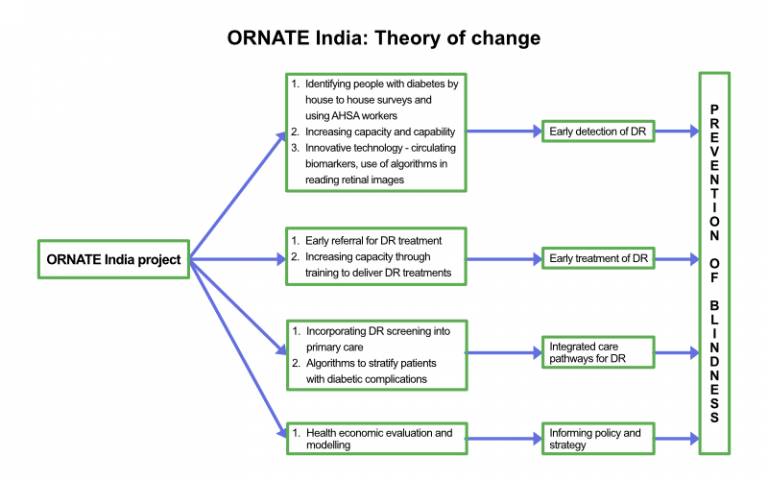Increasing eye research capacity and capabilities to tackle the burden of blindness in India: a research-based UK-India Collaboration (ORNATE India).

Project description
Incidence of diabetes and associated complications such as vision loss due to diabetic retinopathy (DR) is growing. In India, detection and treatment of DR is not supported by a comprehensive primary care infrastructure and high costs prohibit introduction of developed country-style diabetic retinopathy care pathways.
The ORNATE-India programme addresses SDG 3 (Good Health and Well Being). It tests novel patient screening pathways, validates technologies focusing on AI and biomarkers, and evaluates overall feasibility, compatibility and cost-effectiveness, with a view to global translation and reverse innovation.

Through dialogue with relevant policymakers we are changing health policies and guidelines. There will also be significant impact on the population by raising public awareness of complications of diabetes and empowering people with new knowledge.
Technologies arising from this programme will be commercialised. For this we reach out to companies and are already developing aspects of a smart camera technology with a UK company.
Overall, this will foster global economic performance and increase the economic competitiveness of the UK.
A vibrant research network has societal impact and creates lasting legacy through training programmes and creation of new posts.
Collaborations and partnerships in LMICs
We collaborate closely with Indian researchers, clinicians and local governments on all aspects of this project. A steering group composed of all Indian and UK applicants oversees the project and assures that all roles and responsibilities are assigned equitably, taking into account each partner’s strengths. Transparent procedures give a voice to everyone and assure full accountability.
The benefits and impacts of the project activities to LMICs
To date, our tele-screening programme at 20 clinical sites in India has identified over 12,000 individuals with diabetes (22% of those screened). Amongst these 2.5% had DR and were referred for treatment at eye hospitals.
In Kerala, following our pilot study, the State Government has fully adopted this new DR screening and treatment pathway with the aim of extending it across the entire state. Here, 500 accredited social health activists (ASHAs) were also trained to raise awareness of diabetes and its complications.
Development of AI and the validation of biomarkers will widen availability of more cost-effective screening capabilities not only in India and other DAC countries but also in developed countries.
Whilst many aspects of this project are still in their infancy, we have learnt that thorough training, diligence and perseverance, our Theory of Change can be successfully implemented.
Our process increases awareness of diabetes and its various complications, especially DR, and enhances access to improved screening programmes in India. Through wider dissemination of study results, it will also open pathways for change in DAC countries, where the highly diverse research programme strengthens research and clinical capacity and capability.
 Close
Close

